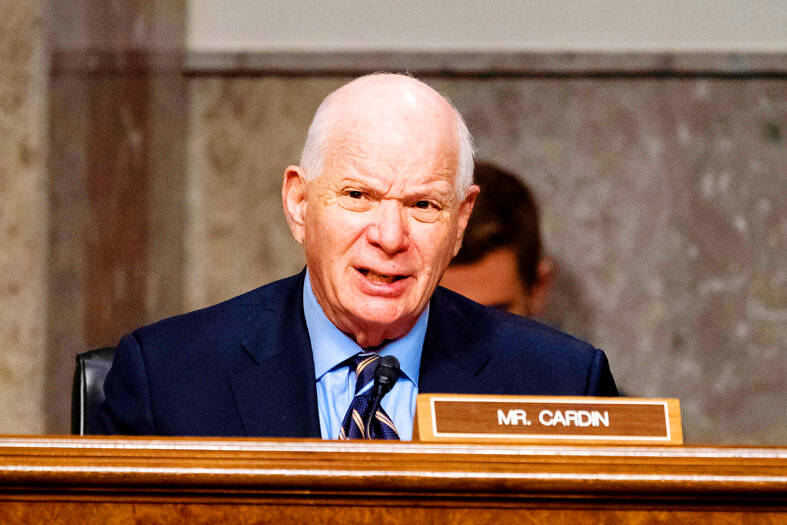South Africa should reconsider its request for Taiwan to relocate its representative office in Pretoria, US Senate Committee on Foreign Relations Chairman Ben Cardin said in a statement released on Thursday.
Cardin also slammed China for mischaracterizing UN Resolution 2758 as requiring other countries to downgrade ties or cut diplomatic relations with Taiwan.
On Oct. 17, the Ministry of Foreign Affairs confirmed that the South African government had in April asked the ministry to relocate its representative office from the capital Pretoria before the end of that month.

Photo: Reuters
The South African Department of International Relations and Cooperation in a statement released on Oct.18 said that severing diplomatic ties with Taiwan was “consistent with resolution 2758 of the UN General Assembly, which is widely adhered to by the international community.”
On Pretoria’s instruction to Taipei, Cardin said: “The South African government’s directive to Taiwan to close its liaison office in Pretoria is deeply concerning and represents a departure from the standard practice for countries that maintain an informal relationship with Taiwan.”
On Pretoria’s statement on UN Resolution 2758, Cardin said: “The reference made to UN General Assembly Resolution 2758 risks lending credibility to the People’s Republic of China’s [PRC] calculated mischaracterization of the nature and history of Resolution 2758, which not only isolates Taiwan further but also undermines its security, potentially setting a troubling precedent for others to follow.”
Resolution 2758 was adopted by the 26th UN General Assembly in 1971 to solve the issue of China’s representation at the UN. It led to the Republic of China (Taiwan’s official name) withdrawing from the UN and the PRC taking its place.
The resolution, which passed on Oct. 25, 1971, recognizes the PRC as the “only lawful representative of China.”
Cardin said Resolution 2758 only addresses the matter of China’s representation at the UN, and does not address the matter of Taiwan’s status or dictate how sovereign countries should engage with Taiwan.
“I strongly urge South Africa to reconsider its actions. The global community must stand united against the Chinese Communist Party’s coercive tactics regarding sovereign nations’ treatment of Taiwan and its deliberate distortion of international statements and resolutions to undermine Taiwan’s support around the world,” he said.
After Taiwan had made it clear that it would not relocate its de facto embassy from Pretoria as “demanded” by South Africa, the ministry on Tuesday said that South Africa was willing to engage in talks on “bilateral relations going forward” through existing channels.
South Africa previously set Wednesday as the deadline for relocating the office.
Six US House representatives — Andy Ogles, Tom Tiffany, Joe Wilson, Chuck Fleischmann, John Rose and Don Bacon — on Tuesday wrote a joint letter to US President Joe Biden asking the administration to re-evaluate South Africa’s preferential treatment under the African Growth and Opportunity Act, which provides sub-Saharan African countries that prioritize free markets and the rule of law with duty-free access to the US market.
The US lawmakers said that South Africa in recent years had “consistently failed to demonstrate a consistent fidelity to the rule of law and routinely takes measures to undermine our nation’s vital security interests.”

Chinese Nationalist Party (KMT) Chairman Eric Chu (朱立倫), spokeswoman Yang Chih-yu (楊智伃) and Legislator Hsieh Lung-chieh (謝龍介) would be summoned by police for questioning for leading an illegal assembly on Thursday evening last week, Minister of the Interior Liu Shyh-fang (劉世芳) said today. The three KMT officials led an assembly outside the Taipei City Prosecutors’ Office, a restricted area where public assembly is not allowed, protesting the questioning of several KMT staff and searches of KMT headquarters and offices in a recall petition forgery case. Chu, Yang and Hsieh are all suspected of contravening the Assembly and Parade Act (集會遊行法) by holding

PRAISE: Japanese visitor Takashi Kubota said the Taiwanese temple architecture images showcased in the AI Art Gallery were the most impressive displays he saw Taiwan does not have an official pavilion at the World Expo in Osaka, Japan, because of its diplomatic predicament, but the government-backed Tech World pavilion is drawing interest with its unique recreations of works by Taiwanese artists. The pavilion features an artificial intelligence (AI)-based art gallery showcasing works of famous Taiwanese artists from the Japanese colonial period using innovative technologies. Among its main simulated displays are Eastern gouache paintings by Chen Chin (陳進), Lin Yu-shan (林玉山) and Kuo Hsueh-hu (郭雪湖), who were the three young Taiwanese painters selected for the East Asian Painting exhibition in 1927. Gouache is a water-based

Taiwan would welcome the return of Honduras as a diplomatic ally if its next president decides to make such a move, Minister of Foreign Affairs Lin Chia-lung (林佳龍) said yesterday. “Of course, we would welcome Honduras if they want to restore diplomatic ties with Taiwan after their elections,” Lin said at a meeting of the legislature’s Foreign Affairs and National Defense Committee, when asked to comment on statements made by two of the three Honduran presidential candidates during the presidential campaign in the Central American country. Taiwan is paying close attention to the region as a whole in the wake of a

OFF-TARGET: More than 30,000 participants were expected to take part in the Games next month, but only 6,550 foreign and 19,400 Taiwanese athletes have registered Taipei city councilors yesterday blasted the organizers of next month’s World Masters Games over sudden timetable and venue changes, which they said have caused thousands of participants to back out of the international sporting event, among other organizational issues. They also cited visa delays and political interference by China as reasons many foreign athletes are requesting refunds for the event, to be held from May 17 to 30. Jointly organized by the Taipei and New Taipei City governments, the games have been rocked by numerous controversies since preparations began in 2020. Taipei City Councilor Lin Yen-feng (林延鳳) said yesterday that new measures by